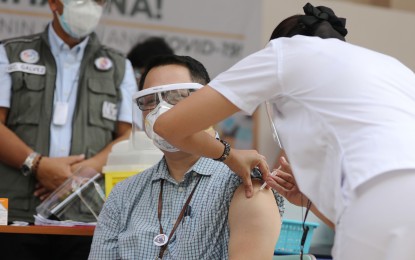
VACCINATION. Dr. Edsel Salvana, director of the Institute of Molecular Biology and Biotechnology at the National Institutes of Health at the University of the Philippines in Manila, receives his first dose of the CoronaVac vaccine on Monday (March 1, 2021). The Department of Health on Tuesday reported that a total of 756 individuals, the majority are healthcare workers, received the vaccine during the first day of its administration. (PNA photo by Joey Razon)
MANILA – On the first day of the national vaccination program rollout Monday, 756 persons, mostly healthcare workers, have been inoculated with the first dose of CoronaVac vaccine, an official of the Department of Health (DOH) said.
In a Laging Handa briefing Tuesday, Department of Health Undersecretary Maria Rosario Vergeire said of this total, 20 individuals have experienced adverse reactions but were treated and able to go home on the same day.
“Among the 20 individuals, they had minor and common symptoms after injection. There are those who experienced pain in their arm after the injection, there was one who experienced itchiness or rashes. There was another who experienced a headache after. One experienced nausea. And the others experienced hypertension,” Vergeire said.
To ensure that those with immediate reactions to the vaccine are treated, she said health institutions administering these vaccines follow a specific process which includes monitoring those vaccinated for 30 minutes on site after the immunization shot and advising them to monitor their health at home.
“Babantayan po natin silang lahat, hindi lang po (We will monitor them all, not only during) post-vaccination, but we will also monitor them for one year kasi alam po natin (because we know) that these vaccines are still under development,” Vergeire said.
To avoid adverse reactions to the vaccine, she advised a good night’s rest, eating breakfast, and relaxation before inoculation.
“We understand the public that they get anxious or they have this fear of side effects before inoculation. That’s why we tell them to get ready before getting vaccinated,” Vergeire said.
Of the 756 individuals who received their first shot of CoronaVac, she said more than 500 were vaccinated in different hospitals for uniformed services such as the Veteran’s Memorial Medical Center, V. Luna General Hospital, and the PNP General Hospital in Metro Manila while the rest were vaccinated in public hospitals.
Priority for these vaccines remains to be healthcare workers and more are expected to be vaccinated.
Vergeire said there will be more vaccination sites and people will be more willing to get jabs following the successful vaccinations of their colleagues.
Those vaccinated are scheduled to receive the second dose of the vaccine after 28 days.
In the coming days, she said the rest of the vaccines will be rolled out in other hospitals in the country such as the Vicente Sotto Memorial Medical Center (VSMM) in Cebu City, the Southern Philippines Medical Center (SPMC) in Davao City, and other national, local, private, and public hospitals nationwide.
“Lahat po ng mga ospital na eligible ay bibigyan. In fact, I think next week, mag-uumpisa na po tayo sa mga private hospital (All hospitals are eligible to receive the vaccines. In fact, I think next week, we’ll begin with the private hospitals),” Vergeire said.
While Metro Manila hospitals, the VSMM and SPMC will be prioritized, she said some doses will trickle down to neighboring hospitals if those on the priority list refuse to receive the vaccine.
“Kapag nagkaroon po tayo ng refusals among all these identified eligible hospitals, meron po tayong tinatawag na quick substitution list kung saan mga tao rin po ng ospital, within the vicinity of that specific eligible hospital, ang kukunan natin (If we have refusals among these identified eligible hospitals, we have a quick substitution list where hospital staff, within the vicinity of that specific eligible hospital, will instead receive the vaccine),” Vergeire said.
On Monday, health workers, government officials, and uniformed personnel began receiving their first dose of the vaccine manufactured by Beijing-based biopharmaceutical firm Sinovac Biotech after the country received 600,000 doses as donation from the Chinese government. (PNA)
